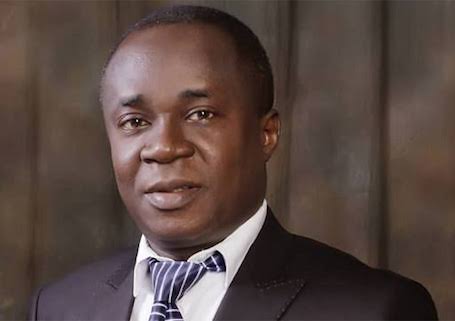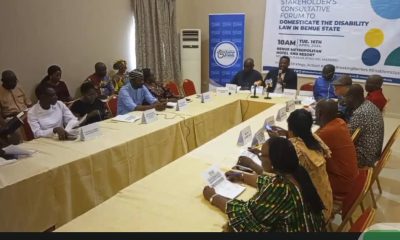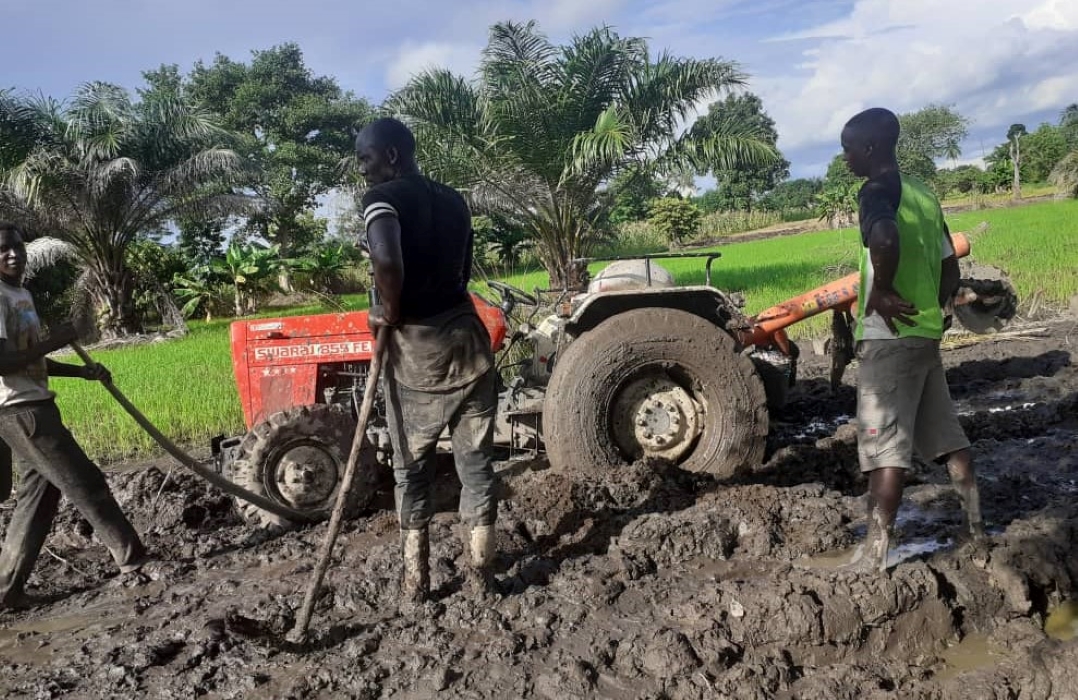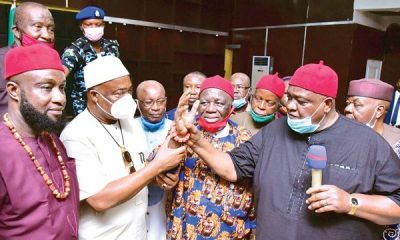Business Analysis
NESG’s Position on Naira Redesign Policy, Cash Scarcity

By Tony Obiechina
The Nigerian economy faced complex challenges in 2022. One of the most significant of these challenges is the prolonged fuel scarcity, which appears to be slowing down economic activity, increasing inflationary pressure, eroding the purchasing power of the Naira, and pushing more Nigerians into poverty.
While ordinary Nigerians and many businesses were devising strategies to mitigate the effects of fuel scarcity and rising inflation, the Central Bank of Nigeria (CBN) announced plans to redesign the country’s currency, specifically the higher denominations, on October 26th, 2022. The announcement came with a tight deadline of January 31st 2023, to phase out the old N200, N500 and N1,000notes – which account for 95.6 percent of the total value of the currency in circulation.
The decision by the CBN to redesign some Naira denominations is not unprecedented in Nigeria, given the history of currency redesigns as obtained in 2007 and 2009 with the lower denomination banknotes. The Naira redesign policy is authorised by Sections 18 (a) and (b) of Nigeria’s Central Bank of Nigeria Act of2007.
According to the Act, the CBN shall (a) arrange for the printing of currency notes and coin minting; and (b)issue, re-issue and exchange currency notes and coins at the Bank’s offices and such agencies as it may establish or appoint from time-to-time.
Both the reasons for the redesign of the Naira and the timing are important factors in examining the policy and the merits of the decision to redesign the currency notes. The CBN highlighted five (5) main reasons for its decision.
As of December 2022, N2.56 trillion (85 percent) out of the N3.01 trillion currency in circulation was outside the banking system. According to the CBN, hoarding of bank notes has led to a scarcity of the notes.
Guard against currency counterfeiting Producing fake Naira notes has become easier due to technological advances. The CBN noted an increase in the rate of currency counterfeiting. Therefore, a redesign was necessary to address the worsening problem of counterfeit according to security reports.
The CBN stated that countries are to redesign their currencies every 5-8 years in line with international standards. This global best practice meant Nigeria lagged in redesigning its currency.
It is expected that introducing new banknotes would stem the tide of terrorist activities and kidnappings as monies outside the banking system are used to make ransom payments; Promote price stability financial inclusion and a cashless economy.
Furthermore, the CBN stated that the policy might lower inflationary pressure, promote a cashless policy supported by the eNaira, and deepen financial inclusion as a reduction of currency outside the banks will induce the need to be financially included in order to engage in economic transactions.
Apart from promoting economic activity, the Naira currency represents Nigeria’s pride and heritage, far more valuable than its face value and purchasing power – what it can buy. Cash is still central to economic activity in Nigeria, where about 90 percent of transactions occur using money.
Therefore, chronic shortages, such as the Naira scarcity experienced since the fourth week of January 2023, due to limited Naira notes printed by the CBN, hoarding by financial institutions and digital financial platform breakdown/malfunction, have economic and socio-cultural consequences for the Nigerian economy and the general populace.
At a broader level, the Nigerian economy is facing continued exchange rate volatility, increased inflationary pressure, and other macro-economic challenges. These issues have deteriorated socio-economic conditions, increasing insecurity, food shortages, and crime.
While this is due to various structural problems, the effects of the pitiable execution of the redesign policy are exacerbating the economy’s situation, mainly because of the prominent role of “cash-in-hand” to economic activities and the unpreparedness of economic actors for the rapid changes which havetaken place. This report details an analysis of the CBN’s Naira redesign policy to provide a critical way forward toward addressing the unintended realities emanating from policy implementation.
Notwithstanding the potential benefits associated with the Naira redesign, which the CBN has captured well, the implementation of the policy has had some unintended effects which mustbe addressed. They include: The Naira redesign policy is begining to take a toll on Nigeria as the economy suffers from a significant decline in the volume and value of cash in ciculation. According to CBN data, the currency’s value in circulation closed at N3trillion in 2022, below its values of N3.3 trillion and N3.2trillion in October and November 2022, respectively.
To beat the Jan 31 2023 deadline for the old notes, people rushed to banks to deposit these notes. As of Mid-December, 2022, only 500 million pieces of redesigned notes estimated at N39.3 billion had been made available bythe CBN. Meanwhile, the redesigned notes should amount to N2.9 trillion in circulation to match the currency absorbed from circulation. This resulted in a shortfall of N2.5 trillion, translating into an 86 percent decline in total currency in circulation in three months.
The cash crunch has had adverse effects on households, informal businesses and formal businesses, particularly the Nano, Micro, Small and Medium Enterprises (NMSMEs) which are the backbone of the private sector-driven economy.
Some of these challenges include, long and unending queues are now common at banks as people often try unsuccessfully to withdraw cash. Time spent attempting to obtain new notes disrupts economic activities; makes it significantly difficult for people to engage in daily activities, as commuting becomes difficult or even impossible when cash is not in hand.
The emergence of local money-changing agents and Point-of-Sale (PoS) vendors that exploit customers who must use cash rather than debit cards or mobile money transfers – by charging outrageous rates.
The limited timing for implementing the Naira redesign policy put the banking system under intense pressure. The failure of Deposit Money Banks (DMBs)to meet the growing demands for cash suggests that the banking system, given the existing technology, is unprepared for a sudden transition from the old Naira notes to the new ones or to cashless economy. Although the CBN extended the deadline for old notes as legal tender by ten days from January 31st, 2023 the pressure on banks has persisted.
Social tensions have been rising recently due to inadequate cash in circulation and the uncertainty resulting from the policy. The excess demand for money has led to social unrest in many parts of the country, such as Ogun, Edo and Oyo states.
Concerns over the implications of poor liquidity for the elections may always contribute to heightened tensions. As elections approach, which is often associated with an increased risk of violence, the unrest arising from the effects of the policy could fuel tensions.
Some of the reasons behind the practical difficulties associated with the Naira redesign can be deduced from the issues arising from the policy. These include: Improper timing, the Naira redesign policy was situated at periods (the end of the year – the festive season – and the peak of the election season) which become with high spending and the increased use of cash. The demand for cash is stronger than usual during these periods. Therefore, the timing subverts the policy’s good intentions and inflicts hardship on the people.
While the CBN has the constitutional right to implement the Naira redesign policy, the inability to reach out to stakeholders in the industry to hone strategies for effective policy implementation and acquire stakeholder buy-intruncated the process. In addition, the general public was not adequately informed about the policy’s motivation and benefits, resulting in ignorance and delays in adjusting to the new policy.
Business Analysis
The New forex regime and 2024 Budget Proposals

By Uche Uwaleke
Overall, the 2024 budget proposals hold a lot of promise for the economy if well implemented.
A major snag, however, stems from the likely distortionary impact of the new Forex regime.
A naira float in the face of weak supply and strong demand with its attendant forex market volatility introduces uncertainty in budget implementation.
This is why I consider the N750 to the dollar rate used for the 2024 budget as a tall order.
It’s most likely the exchange rate will be the major cause of wide budget variances in the 2024 budget on account of NAFEM operations.
This is particularly so in respect of the dollar-denominated component of the budget much of which can be found in the over N3 trillion proposed defence spending as well as in recurrent debt expenditure.
A volatile and high exchange rate will increase the cost of servicing external debt and further widen the budget deficit.
In my view, a well implemented and corrupt-free dual (not multiple) exchange rate regime (one official including for debt service and another tier for other transactions) helps to bring certainty in government procurements and short term planning in general.
A related issue has to do with the mode of financing the over N9 trillion deficit and its likely impact on cost of capital for firms and the stock market.
Unlike in previous budgets where the amount voted for new borrowings were split fairly equally between domestic and foreign sources, this time around domestic borrowing is taking up a huge chunk at about 78% (N6.1 trillion out N7.8 trillion provisioned for new borrowings)
This can have the effect of crowding out the private sector, hiking interest rates, increasing cost of funds and depressing the equities market as investors migrate to fixed income securities. The outcome will be a further weakening of the productive sector.
In this regard, the government is advised to explore more opportunities for concessional project-tied loans from multilateral and bilateral sources. This will help to boost forex reserves and stabilize the exchange rate.
With respect to borrowing domestically, it’s important that emphasis should be placed on the use of the right instruments such as infrastructure bonds as opposed to FGN bonds that are inflationary prone.
Uwaleke is Nigeria’s first Capital Market Professor
Business Analysis
CBN’s Monetary Policy Committee Meeting and the Frenzy?

By Ademola Oyetunji
The atmosphere in the Nigeria’s financial sector is in a state of frenzy. Stakeholders are befuddled on why the apex bank’s monetary policy committee have not met. This is because the CBN had twice postponed the meeting under the leadership of its new Governor.
The first postponement scheduled to hold shortly after the appointment of Mr.
Cardoso and his four deputy governors, was obviously put on hold to enable them settle down. The reason could also be that the new management team needs time to study and digest President Tinubu’s 8-point agenda and current trends in the financial system to align them with his vision.Mr. Cardoso at the NASS screening had promised to ensure the independence of CBN. He also pledged to ensure that the CBN under his watch will play its role as a catalyst for growth, and adviser to the government. He said “his-CBN” will shy away from interloping responsibilities.
It is also a common knowledge that President Tinubu had ordered a clean house of the Bank believed to have veered of its mandate under the immediate past governor.
It is also a public knowledge and concern that the Naira has been under attack by speculators and rent seekers, a chronic headache for the Bank’s new helmsmen. Forex illiquidity has also become malignant. Thus, convening the MPC meetings amidst these challenges may not be an immediate priority, rather they have been unobtrusively addressing and stabilizing the financial sector. The gains of these efforts are visible, though the parallel market is still chaotic.
The postponement of what was supposed to be its last meeting for the year further heightens the palpable fear and uncertainties of the consequences of the MPC not meeting. Stakeholders’ fear cannot be dismissed as Nigerians battle economic hardship, rising food inflation and unbridled Naira depreciation.
However, the CBN Act 2007 section 12 saddles the Committee to ensure price stability and support economic policy of the federal government. The Committee consists of the Governor as the chairman, the four deputy governors, two members of Board of Directors, two members appointed by the Governor, and two members appointed by the President to formulate monetary and credit policy.
It is the highest policy making organ of the Bank responsible for reviewing economic and financial conditions in the economy. It also determines the appropriateness of policy applications in short to medium term, and regularly reviews Bank’s monetary policy framework, and adopt changes when necessary.
The Act mandates the Committee to communicate monetary and financial policy decisions effectively to the public and must ensure the credibility of the model of transmission mechanism of monetary policy. It is to meet bi-monthly, except otherwise (as it is the case presently) or on emergency.
Until the appointment of the present CBN Governor, the Committee had met four times under the last dispensation. It is also a public knowledge that boards of federal parastatals and agencies were dissolved by the President with many yet to be reconstituted. The CBN board is one of those dissolved and yet to be reconstituted, neither is it a public knowledge that the President has nominated his two candidates.
Hence, the Bank presently does not have the required number to form a quorum, nor the Governor and his deputies have the constitutional mandate to overtly make certain monetary policy decisions without the approval of the Board.
The concern by the public is normal, particularly the way economic saboteurs have been attacking the Naira and manipulating the parallel forex exchange market. The concern is also noted considering the latest inflationary figure, 27.33%, released by the National Bureau of Statistics (NBS).
But to allay the fears of the public, the Bank’s spokesman, Dr. Isa Abdulmumin had on the eve of the scheduled September MPC meeting issued a press statement to announce its postponement. He regretted any inconvenience the change in date may have caused the Bank’s publics.
The hullabaloo over non-holding of the meetings may have been misplaced but expected. And with Nigeria’s current economic reality, it behooves the economic managers to be strategic in meeting economic saboteurs at their wits ends.
Notable economists and financial technocrats have entertained worries over continuous postponement of the organ’s meeting. They believed it may further heighten economic uncertainties. Mr. Boluwafemi Agboladun, a chartered accountant, expressed fears that the silence from the Bank amidst economic turbulence is unsettling as no concrete reason was given for not holding the meetings.
He was however quick to add that the strategy adopted so far by the new management of the Bank is yielding positive dividend. There is stability in the forex market, and Naira exchange rate is no longer volatile. The strategic management adopted by the CBN so far, he noted, is commendable, making currency peddler unsure of what next is coming out from the Bank.
Agboladun also felt that the new CBN Governor may have decided to start the new year with his own monetary policy calendar after he would have gotten a clear heads-on of the fiscal direction to align it with his monetary policy philosophy. He stressed that, it is better for the CBN and the government to have a clear distinction in roles, unlike the muddled and overlapped responsibilities witnessed in the last administration.
Feranmi Deepak, a public commentator, was not surprised that the meeting, though statutory, has suffered two postponements. He was only worried that the outcome of the meetings would have avail the public of the monetary policy direction of Mr. Cardoso, as it would have road mapped investment decisions by local and foreign investors.
The CBN, he observed, may also be taking its time coming out with its agenda. This, he noted, may be due to the ongoing economic diplomacy drive of the President who has been unrelenting in his travels, marketing Nigeria. Therefore, the CBN, he said, “may be collating all he has been saying to the investing community to develop its monetary policy roadmap as government banker and advisor”.
He was optimistic that the MPC meeting would assume its normal mode next year, when probably the President in his wisdom would have reconstituted the bank’s board to allow for normalcy in its calendar and restore stability in the financial sector.
*Ademola Oyetunji writes fro
Business Analysis
Tweaking CBN Act, NASS Must Tread with Caution

By Chisom Adindu
The ongoing effort by National Assembly to tinker with the Central Bank of Nigeria’s Act, 2007, has been generating heated debate within the polity. The concern has been the rationality of the exercise. This effort is spearheaded by two distinguished Senators, Senators Steve Karimi and Darlington Nwokocha.
The bills are – ‘A Bill to Amend the Central Bank of Nigeria Act 2007, and Matters Connected Therein’, and An Act to Amend the Central Bank (establishment) Act 2007 to Make the Central Bank More Transparent and Accountable in its Operations and to Ensure Enhancement of its functions and for Connected Matters’.
The crux of the two amendments already consolidated by the Senate is the ban on the CBN governor and his deputies from partisan politics, reconstitution of the CBN Board; subjection of CBN staff renumeration to the Salaries and Wages Commission; and ceding the position of the Board Chairman to a person outside the CBN. Also proposed prohibition of use of foreign currency in local transactions. Until this proposal, the Governor doubles as the Board Chairman.
The preoccupation of the sponsors of the bills is to enhance transparency and efficiency of the Central Bank of Nigeria, and to strip its governor of certain powers. The Senate Committee on Banking and Finance is saddled with the responsibility of reviewing and working on these bills for the Senate to take a position.
Whatever is the expectation of the sponsors, it is important that the National Assembly does not in a spasm of emotion erode the independence of the Bank. CBN Act 2007 had settled this.
It was a common knowledge that the immediate past CBN governor’s hiatus and unprofessional conduct by engaging in partisan politics may have warranted this quest. His action was an infraction, and antithetical to his oath of office. It was also against the norms of central banking ethics. Anger against a rare singular infraction should not be used as an excuse to cripple a vital organ of government as the CBN. It amounts to throwing the baby away with the bath water.
An International Monetary Fund (IMF) working paper titled: The Role of Board Oversight in Central Bank Governance: The Legal Design Issues describe the Central Banks as a public law institution established to fulfill essentially sovereign functions delegated to them by the State. It admitted that certain central bank laws explicitly prohibit certain operations.
Continuing, the paper said, for a central bank to be effective, it must enjoy a high level of autonomy vis-à-vis both political institutions and private economic interest. This autonomy it enumerated as: institutional, functional, personal, and financial. Institutionally it said the central bank should not be influenced by the State or private third parties in its decision-making in the context of the performance of its functions, e.g., through ministerial instructions.
Functional points to its capability to implement its functions without direct governmental interference, and Personal ensures that key decisions makers of the central bank (Governor and members of the Executive Board, Monetary Policy Committee and Oversight Boards) are autonomous from political and private economic interest.
The Financial entails the capability of the bank to pursue its mandate by way of the financial means required to do so (the emphasis is mine).
Banning the CBN governor and his deputies from partisan politics is a good proposal, and well approved. But to appoint/impose an outsider as the chairman of the board other that its governor is incongruous with global central banking practice.
Typical of our clime, as being proposed, will not augur well for a critical institution as the CBN. The infraction of its former governor – highly condemned, is not an excuse to deal a fatal blow on the Bank. It amounts to killing a fly with a sledgehammer.
Subjecting its staff salaries to an external body violates the financial independence of the Bank. Infractions committed by its former governor has nothing to do with staff welfare. There are other organs of government earning far higher than the CBN staff, yet the legislators turned the blind eye.
Why are all eyes on the CBN? Are the Nigeria National Petroleum Plc staff salaries a subject of scrutiny by the National Salaries and Wages Commission? The Debt Management Office (DMO), Nigeria Deposit Insurance Corporation (NDIC), and many others. It is public knowledge that the staff of some of these agencies earn fantastically higher, (excluding other perks) than the CBN staff.
The Central Bank of Nigeria like its peers is the heart of the monetary system of the country. Nigeria’s economy is influenced heavily by the actions it takes, thus, any spasm of irrational decisions to alter or whittle what international investors and global partners would see as an erosion of the Bank’s independence, will further hurt the already fragile economy.
It was the Central Bank of Nigeria during the COVID-19 pandemic that ensured the stability of the economy while other organs of government were at a loss on what to do. The CBN should not be politicized. What happened under Godwin Emefiele was a rash decision that should be treated in isolation.
Amending the Act is not investor friendly, and it should be jettisoned. It will also encumber the effectiveness of monetary policy, and once the institution is seen as an appendage of the political class, there will be loss of faith, and confidence, in the economy. Ultimately, the economy will suffer for it.
Mr. Uche Tochukwu, a financial expert, said tweaking the CBN Act now, just because of what happened under Godwin Emefiele will hurt the economy and the integrity of the CBN. He welcomed the decision of the lawmakers to ban the Governor and his deputies from partisan politics but frowned at appointing an outsider as the Bank’s Board Chairman. He said it is an aberration.
Tochukwu called the attempt to subject the CBN staff salary to Salaries and Wages Commission as meddlesomeness. What about their own opaquely fatty allowances the public has decried? Doing that, they advised, will kill the morale of the staff. Are we even sure the staff are earning fantastically, he asked?
The legislators should get serious with other national pressing issues in the economy rather than tampering with the CBN Act. Dr. Babatunde Adisa, an economist expressed this. He said, globally, independence of central banks is high advocacy, why is our own legislators thinking of reversing the CBN gear of progress. He said those advocating for the weakening of the CBN governor’s power or administration of the institution are not in tune with reality.
Thus, the National Assembly should be guided as posterity will not forgive them if they are resolute on this unprofitable voyage.
Chisom Adindu writes from Umuahia, Abia State.























